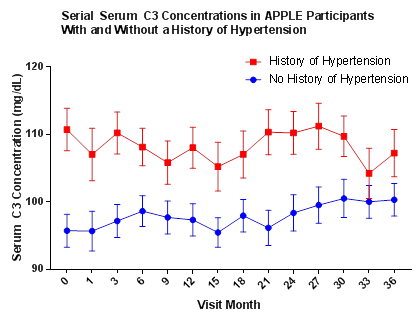Session Information
Session Type: ACR Poster Session C
Session Time: 9:00AM-11:00AM
Background/Purpose: Chronic systemic inflammation, mediated in part by complement, and inadequate vascular repair mechanisms affect patients with cSLE from a young age and are associated with cardiovascular morbidity. In non-SLE affected patients with cardiovascular disease (CVD) and hypertension, complement levels are increased. In contrast, complement levels are relatively low in SLE when the disease is active. We leveraged data from the Atherosclerosis Prevention in Pediatric Lupus Erythematosus (APPLE) Trial and its cSLE cohort to further investigate the relationship between complement and CVD in SLE. We hypothesized that serial levels of serum C4 and C3 would be higher in patients with hypertension than in those without. We also hypothesized that C4 levels would be influenced by total C4 gene copy number (GCN).
Methods: Clinical data for the three-year study of 221 cSLE patients, plus genomic DNA and plasma samples for 197 patients, were provided by the APPLE repository. Total C4 GCN was measured by TaqMan-based quantitative realtime PCR and Southern blot analyses using genomic DNA. Baseline serum C4 levels were compared to total C4 GCN using linear regression. Least-squares regression was used to assess the effect of hypertension, defined by baseline physician-report, on serial serum C4 and C3 protein levels.
Results: A linear relationship was demonstrated between baseline serum C4 levels and total C4 GCN. A one-copy increase in GCN correlated with an increase in serum C4 of 3.28 mg/dL (p=1.8×10-6; R2=0.12). Compared to normotensive individuals, individuals with a history of hypertension had significantly higher baseline levels of serum C4 (18.5 mg/dL vs 13.5 mg/dL; p=4.7×10-6) and serum C3 (110.7 mg/dL vs 95.7 mg/dL; p=3.0×10-4). A history of hypertension had a positive effect on serial serum C4 levels (Figure 1; p=5.0×10-25) and serum C3 levels (Figure 2; p=5.8×10-20).
Conclusion: In the APPLE Trial, cSLE patients who were hypertensive had significantly higher baseline and serial concentrations of serum C4 and C3 than non-hypertensive cSLE patients. Total C4 GCN directly affected total serum C4 levels. Further elucidating the relationship between complement GCN, serum complement protein levels, and CVD in SLE could allow for more precise real-time interpretation of complement data and may provide an opportunity for early identification of cSLE patients at highest risk for poor cardiovascular outcomes.
Figure 1.
Figure 2.
To cite this abstract in AMA style:
Mulvihill E, Ardoin SP, Thompson SD, Zhou B, Yu G, Singer NG, Levy DM, Brunner HI, Wu YL, Nagaraja H, Schanberg LE, Yu CY. Patients with Childhood-Onset SLE (cSLE) and Hypertension Have Consistently Higher Serum Concentrations of C3 and C4 Than Those without Hypertension [abstract]. Arthritis Rheumatol. 2018; 70 (suppl 9). https://acrabstracts.org/abstract/patients-with-childhood-onset-sle-csle-and-hypertension-have-consistently-higher-serum-concentrations-of-c3-and-c4-than-those-without-hypertension/. Accessed .« Back to 2018 ACR/ARHP Annual Meeting
ACR Meeting Abstracts - https://acrabstracts.org/abstract/patients-with-childhood-onset-sle-csle-and-hypertension-have-consistently-higher-serum-concentrations-of-c3-and-c4-than-those-without-hypertension/


